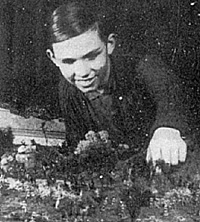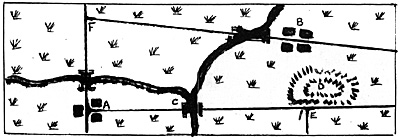 I was quietly reading the newly arrived
Wargamer's Newsletter and my wife was reading the
bills and other morning mail. Suddenly she
exclaimed enthusiastically.
I was quietly reading the newly arrived
Wargamer's Newsletter and my wife was reading the
bills and other morning mail. Suddenly she
exclaimed enthusiastically.
"A letter from Elizabeth -- she's driving up to town next Thursday and wants me to have lunch with her and spend the afternoon shopping; and what is more apparently young Seymour is now an enthusiastic Wargamer!"
Elizabeth, I should explain is my wife's niece and Seymour, a youth of thirteen or so, is Elizabeth's eldest offspring and one of my least favourite people. My wife paused before dealing the body blow.
"Elizabeth says he's dying to see your soldiers and she suggests driving here, dropping him off, so that he can keep you company for the day and then she'll pick him up on her way home in the evening."
In my mind's eye I had been planning to spend the day in question in demonstrating to myself in a solo wargame my own excellent generalship, and my failure to greet the threatened interruption of my scheme must have been apparent.
"It will be very nice for you to have someone to play soldiers with -- I'll leave a cold lunch and I'm sure Seymour will be quite capable of getting some tea for you. It should be great fun for you. I shall ring Elizabeth this evening."
I winced palpably at her words but they bore the stamp of finality and I resigned myself to a day in the company of Seymour.
Two days later a bulky envelope arrived for me containing a letter from Seymour and a photostat booklet of about fifty pages pretentiously entitled -- Rules and Instructions for the Conduct of War Games. Researched, compiled and annotated by Seymour Haddington Brownlow. Period 1789 to 1815 Continent of Europe. The letter also was typical.
- "Dear Uncle James,
I cannot tell you with what pleasure I am looking forward to our day together in the pursuit of our mutual hobby. I look forward to gleaning a few hints from you and suggest if I may that you might like to construct a suitable interesting terrain and we could then toss up for sides. I suggest roughly equal forces and I should prefer the Napoleonic period for which I enclose a copy of my rules. Of course if there is anything contained in them with which you do not agree please do not hesitate to let me know and we can consider suitable amendment if necessary. Similarly if there is some important point which I have overlooked and which you consider should be included perhaps you would let me know.
Your affectionate nephew, Seymour."
Very polite in an insufferable way, and knowing Seymour's propensity for winning everything from 'Happy Families' when he was about five to a humiliatingly short game of Chess when he had visited us a couple of years previously, I sensed the ringing of alarm bells. I sat down and began to wade through his rules which, as mine are contained on one and a half pages of foolscap, I found tedious to say the least. After the first ten pages I skipped hastily through the remainder making a note here and there and then cast them aside. After some deliberation I put together a simple lay-out and resigned myself to the advent of Seymour on the following day.
His mother deposited him promptly at 10.30 and after a welter of last minute instructions regarding food and the like she and my wife were soon driving Londonwards while I prepared to face the fortunes of war. Seymour was already ensconced in my Wargames Room intently studying the shelves which take up one wall from floor to ceiling.
"You've added a bit to your collection since I saw it last Uncle James" he observed. "Still got those old Thirty Year War flats -- gathering a bit of dust aren't they?"
He passed along the shelves in the manner of visiting Royalty inspecting a not very smartly turned out Guard of Honour.
"Are those Highlanders supposed to be 42nd? I don't think they wore sporrans in 1815. What are those elephants? Persian or Carthaginian? The Persians used Indian elephants but Hannibal and his lot got theirs from Africa. There are physical differences you know. The Africans have bigger ears."
His sharp eye travelled critically along the Mediaevals.
"Ah ha! Some amateur heraldry on some of those shields, Uncle James. I don't think the King of Arms would approve Azure on a field or Colour or tincture on metal or vice versa is the rule."
I produced a contemporary print showing an officer of the Black Watch complete with sporran, exhibited a number of coats of arms, mainly middle European which did not conform to usual rules on Heraldry and tried to prove not very convincingly that Hannibal could have employed Indian elephants.
But he was busy on the Colonials -- the Gatlings were the wrong colour, the flashes on the Infantrymen's sun helmets were incorrect and the Mahdifs flags were green instead of black. He waved aside my arguments, remarking modestly that he was a stickler for detail but realised that everyone was not quite so fussy as he was.
He then turned his attention to the table and approved the lay-out with that authoritative nod of the head usually reserved for full Generals and above. It was decided that we should each have a force of thirty regiments with artillery and engineers. Each side was to be organised into two infantry divisions with a Commander and Staff. Simultaneous moves, orders in writing and Divisional orders written three moves in advance and varied only after consultation by courier with the Commander in Chief. Each side would start deployed along one of the long edges of the table and I had already fixed a Wellsian curtain along the middle to veil our preparations from one another.
"Do you mind if I have an Austrian Army, Uncle? I rather like those white, coats and I expect you fancy yourself as Napoleon."
"Help yourself" I muttered tersely. "Troop trays are under the table."
"I say we haven't tossed for sides" said Seymour.
"Have whichever you like." I replied airily.
"Right, I'll take the southern edge -- I think that gives you a bit more room to get round the table" he added magnanimously.
 For about half an hour there was silence punctuated by the clink of metal and some heavy
breathing on my side. Above the curtain I could just see the top of my nephew's head and he appeared to be concentrating on the western side of the table. I placed my Field Artillery and Howitzer batteries, centre facing Road Junction 'F'. On either side of them in ordre mixte were my two Infantry Divisions each consisting of twelve regiments. The six cavalry regiments and three batteries of Horse Artillery were deployed eastward from the river at 'B' facing the hill at 'D'.
For about half an hour there was silence punctuated by the clink of metal and some heavy
breathing on my side. Above the curtain I could just see the top of my nephew's head and he appeared to be concentrating on the western side of the table. I placed my Field Artillery and Howitzer batteries, centre facing Road Junction 'F'. On either side of them in ordre mixte were my two Infantry Divisions each consisting of twelve regiments. The six cavalry regiments and three batteries of Horse Artillery were deployed eastward from the river at 'B' facing the hill at 'D'.
Eventually Seymour declared himself ready and the curtain was removed to reveal the boy's duplicity; He had in fact concentrated the bulk of his forces on the Eastern side of the river with one division consisting of four Guard regiments and eight Jager regiments facing Hill 'D'. His second division was deployed from the left flank of the first to the river at 'C'. Behind the village at 'A' were his cavalry and four Howitzer batteries. He was smiling complacently as we set to work to write out our advanced orders. I gazed anxiously at the bust of Napoleon on the mantlepiece. What would the great man have done. Left it to Berthier to sort out the traffic jams which I could foresee building up in area of the bridge at 'B' as I sought to shift my forces from one flank to the other. My thoughts were interrupted by Seymour:
"I say Uncle who are those chaps with the pink collars?"
"Horse Grenadiers of the Guard, my boy and they have not got pink collars." He peered critically at them.
"Pink collars or rather long faces -- and why not in the circumstances," he hooted.
I ignored the jibe. My painting is not that good and they were only 15mm. I concentrated on the military problem but again his voice intruded.
"The trumpeter ought to be on a grey horse not a black one. Grey or white."
To hell with it! I would launch a straight attack across the river -- the Sapeurs could build a pontoon - I would force the crossing with-infantry closely supported by guns. The left wing would have to take care of itself until I reached the bridge at 'C' and struck him in the rear.
"What about weather cards?" enquired my nephew. "I presume you do have weather cards?" This time I was ready for him. "Of course. Would you care to cut the cards?" I extended the small pack to him. The weather was type B - very warm and dry with a light southerly wind. The worst that could develop from that as the game progressed was heavy rain which might add to my difficulties in crossing the river.
"Wind southerly - hard luck Uncle James, I'm afraid that means your chaps will be getting the smoke blown back in their faces" exclaimed Seymour, adding crisply "That's ten per cent reduction in firing efficiency - Rule 74.11."
Part II: Nephews and Napoleons
Back to Table of Contents -- Wargamer's Newsletter # 154
To Wargamer's Newsletter List of Issues
To MagWeb Master Magazine List
© Copyright 1975 by Donald Featherstone.
This article appears in MagWeb (Magazine Web) on the Internet World Wide Web.
Other military history articles and gaming articles are available at http://www.magweb.com